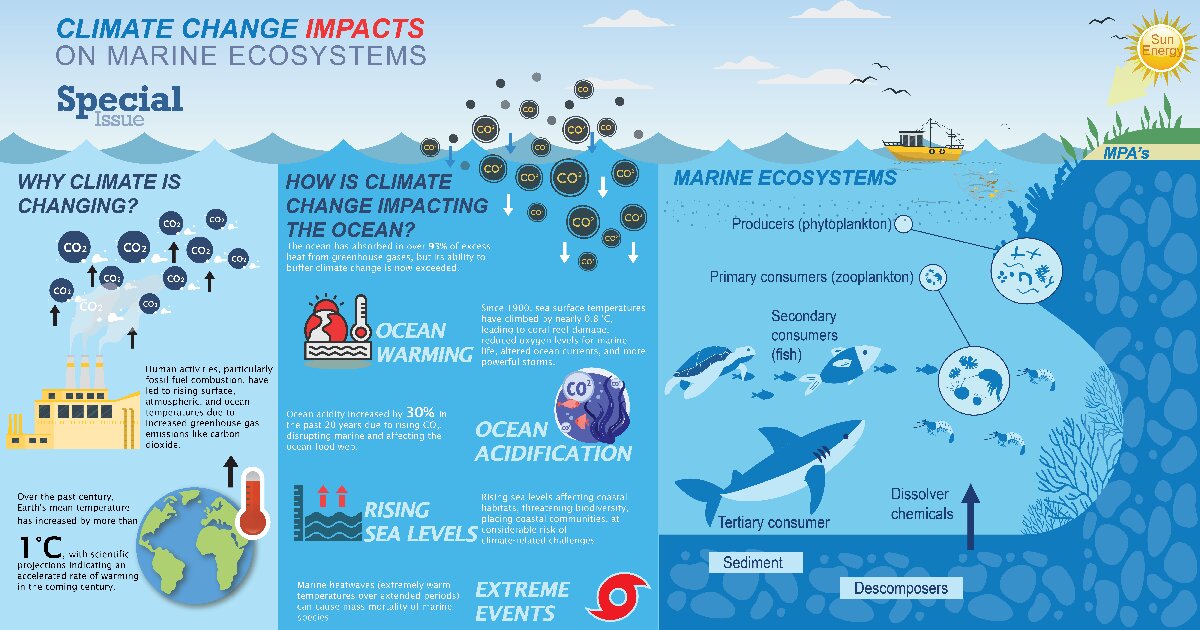Impact of Climate Change on Marine Ecosystems
A special issue of Water (ISSN 2073-4441). This special issue belongs to the section "Biodiversity and Functionality of Aquatic Ecosystems".
Deadline for manuscript submissions: closed (25 November 2025) | Viewed by 10484

Special Issue Editor
Interests: climate change; global change; biodiversity; ecosystem functioning; marine and coastal ecosystems; ocean acidification; marine invertebrates; invasive species
Special Issues, Collections and Topics in MDPI journals
Special Issue Information
Dear Colleagues,
Marine ecosystems are among the most diverse on the planet, playing crucial roles in maintaining global biodiversity and supporting vital ecosystem services. However, climate change is increasingly disrupting these ecosystems, leading to shifts in species distribution, alterations in marine food webs, and declining ecosystem health. This Special Issue aims to explore the wide-ranging impacts of climate change on marine ecosystems, with a focus on biodiversity, species interactions, and ecosystem functionality. We welcome submissions in key areas such as the effects of temperature rise on marine biodiversity, the role of ocean acidification in altering marine habitats, the interaction between climate change and anthropogenic activities, and changes in primary production and nutrient cycling. Studies that propose adaptive strategies or mitigation approaches to counteract the negative impacts of climate change are also of great interest.
Dr. Md Khurshid Alam Bhuiyan
Guest Editor
Manuscript Submission Information
Manuscripts should be submitted online at www.mdpi.com by registering and logging in to this website. Once you are registered, click here to go to the submission form. Manuscripts can be submitted until the deadline. All submissions that pass pre-check are peer-reviewed. Accepted papers will be published continuously in the journal (as soon as accepted) and will be listed together on the special issue website. Research articles, review articles as well as short communications are invited. For planned papers, a title and short abstract (about 250 words) can be sent to the Editorial Office for assessment.
Submitted manuscripts should not have been published previously, nor be under consideration for publication elsewhere (except conference proceedings papers). All manuscripts are thoroughly refereed through a single-blind peer-review process. A guide for authors and other relevant information for submission of manuscripts is available on the Instructions for Authors page. Water is an international peer-reviewed open access semimonthly journal published by MDPI.
Please visit the Instructions for Authors page before submitting a manuscript. The Article Processing Charge (APC) for publication in this open access journal is 2600 CHF (Swiss Francs). Submitted papers should be well formatted and use good English. Authors may use MDPI's English editing service prior to publication or during author revisions.
Keywords
- biodiversity and ecosystem functioning
- global change
- marine pollution
- fisheries and food security
Benefits of Publishing in a Special Issue
- Ease of navigation: Grouping papers by topic helps scholars navigate broad scope journals more efficiently.
- Greater discoverability: Special Issues support the reach and impact of scientific research. Articles in Special Issues are more discoverable and cited more frequently.
- Expansion of research network: Special Issues facilitate connections among authors, fostering scientific collaborations.
- External promotion: Articles in Special Issues are often promoted through the journal's social media, increasing their visibility.
- Reprint: MDPI Books provides the opportunity to republish successful Special Issues in book format, both online and in print.
Further information on MDPI's Special Issue policies can be found here.





